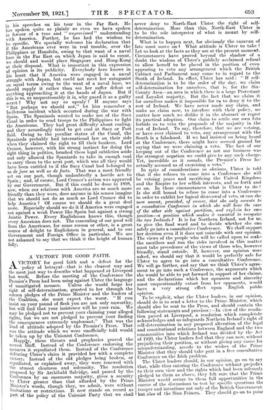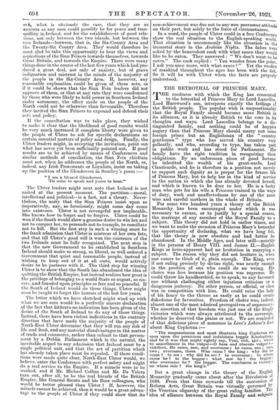A VICTORY FOR GOOD FAITH.
is,.VICTORY for good faith and a defeat for the policy of betrayal—that is the clearest way and the most just way to describe what happened at Liverpool last week. Before the meeting of the Conference the Premier's Press had been using against Ulster the language of unmitigated menace. Unless she would forgo her right of sell-determination, granted to her through the solemn pledges of the Prime Minister and the leaders of the Coalition, she must expect the worst. " If you insist on your pound of flesh you are not only unworthy, but will find•that your insistence will be your ruin. We May be pledged not to prevent your claiming your alleged rights, but we are not pledged to prevent your finding the consequences extremely unpleasant." That was the kind of attitude adopted by the Premier's Press. That was the attitude which we were unofficially told would be taken up by the Unionist Conference. Happily, these threats and prophecies proved the merest bluff. Instead of the Conference endorsing the menaces it repudiated them. Instead of the Conference defeating Ulster's claim it provided her with a complete victory. Instead of the old pledges being broken, or repudiated, or explained away, they were renewed with the utmost clearness and solemnity. The resolution proposed by Sir Archibald Salvidge, and passed by the Conference by an enormous majority, gives a security to Ulster greater than that afforded by the Prime Minister's words, though they, we admit, were without limitations or restrictions. It now stands on record as Pat of the policy of the Unionist Party that we shall never deny to North-East Ulster the right of self- determination. More than this, North-East Ulster is to be the sole interpreter of what is meant by self- determination.
What is to happen next, for obviously the caravan of fate must move on-? What attitude is Ulster to take ? Let us look at the facts as they are at the present moment. Circumstances have proved beyond the shadow of a doubt the wisdom of Ulster's publicly acclaimed refusal to allow herself to be placed in the position of even appearing to veto any arrangement which the British Cabinet and Parliament may come to in regard to the Sbuth of Ireland. In effect, Ulster has said : " If self- determination is to be the order of the dav, we claim self-determination for ourselves, that is, for the Six- County Area—an area in which there is a large Protestant and Loyalist majority. But the fact that we claim it for ourselves makes it impossible for us to deny it to the rest of Ireland. We have never made any claim, and make no claim now, to interfere with their policy, no matter how much we dislike it in the abstract or regret its practical adoption. Our claim to settle our own fate forbids us to veto the proposals of the majority in the rest of Ireland. To say, therefore, that we are vetoing, or have ever claimed to veto, any arrangement with the South is a falsehood. If we had insisted on being heard at the Conference, there might have seemed ground for saying that we were claiming a veto. The fact of our keeping out of the Conference as not our business was the strongest negation we could give to any such charge. Yet, incredible as it sounds, the Premier's Press hat: actually accused us of exercising a veto."
In spite of considerations so obvious, Ulster is told that if she refuses to come into a Conference she will be vetoing peace and sacrificing the UniVd Kingdom and the Empire to her selfish interests, and so forth and so on. In these circumstances what is Ulster to do ? Is she still bound to refuse to come into a Conference in order to exhibit her logical disavowal of veto, or can she now assent, provided, of course, that she only assents to a consultative Conference in which she will hear the case of the other side against partition, and explain her own positions—a position which makes it essential to recognize the two Irelands? It is for Northern Ireland, not for us, to give the final word and to decide whether she can safely go into a consultative Conference. We shall support her decision even if it does not coincide with our opinion. The views of the people who will be called upon to make the sacrifices and run the risks involved in this matter must take precedence of the views of those who, however friendly, stand outside. If, however, our opinion were asked, we should say that it would be perfectly safe for Ulster to agree to go into a consultative Conference. We will go further, and say that we think Ulster's agree- ment to go into such a Conference, the arguments which she would be able to put forward in support of her claims, and the declarations which her openness and sincerity must unquestionably extort from her opponents, would have a very strong effect upon English public opinion. To be explicit, what the Ulster leaders, in our opinion, should do is to send a letter to the Prime Minister, which should also be sent to the Press, and should contain the following statements and provisos :—In view of the resolu- tion passed at LiVerpool, a resolution which completely acknowledges and so safeguards Northern Ireland's right of self-determination in any proposed alteration of the legal and constitutional relations between England and the two communities into which Ireland was divided by the Act of 1920, the Ulster leaders feel that they can now, without prejudicing their position, or without giving any cause for misunderstanding, accede to the wishes of the Prime Minister that they should take part in a free consultative Conference on the Irish problem. The Ulster leaders should, in our opinion, go on to say that, while thus entering the Conference without prejudice to their own view and the rights which had been solemnly pledged to them as above, they felt sure that the Prima Minister would secure to them full opportunities in th( course of the discussions to test by specific questions thi temper and intentions not only of the British Government but also of the Sinn Feiners. They should go on to point ot.t, what is obviously the case, that they are as anxious as any men could possibly be for peace and tran- -quillity in Ireland, and for the establishment of good rela- tions, not only between the two islands, but between the two Irelands—between, that is, the Six-County Area and the Twenty-Six County Area. They would therefore be most glad to take this opportunity to hear the views and aspirations of the Sinn Feiners towards themselves, towards Great Britain, and towards the Empire. There were many things done in the course of the last five years which had pro- duced a great deal, not only of anxiety, but of grave indignation and mistrust in the minds of the majority of the people in the Six-County Area. If, however, any reasonable explanation could be given of these acts, or if it could be shown that the Sinn Fein leaders did not approve of them, or that at any rate they were condemned by those who were likely to hold power in Southern Ireland under autonomy, the effect made on the people of the North could not be otherwise than favourable. Therefore they invited the Sinn Feiners to expound and defend their acts and policy.
If the consultation was to take place, they wished to make it clear that the likelihood of good results would be very much increased if complete liberty were given to the people of Ulster to ask for specific declarations on certain essential matters of policy and design. Finally, the Ulster leaders might, in accepting the invitation, point out what has never yet been sufficiently pointed out. If good results are to be achieved by means of Conferences and similar methods of conciliation, the Sinn Fein chieftain must not, when he addresses the people of the North, or, indeed, any Irish' Protestants or Loyalists, insist on taking up the position of the Glendoveer in Southey's poem :- " I am a blessZd Glendoveer,
'Tis mine to speak and yours to hear."
The Ulster leaders might next note that Ireland is not united at •the present moment. The partition—moral, intellectual and political—is a fact, not a theory. Never- theless, the unity that the Sinn Feiners insist upon so imperatively, nay, so ferociously, might some day come into existence. Ulster is not revengeful nor implacable. She knows how to forget and to forgive. Ulster could be won if the South would show a genuine desire to win her and not to conquer her, to persuade not to trample, to conciliate not to kill. But the first step in such a winning must be the frank admission that Ulster is mistress of her own fate, and that till Ulster's good will is won the existence of the two Irelands must be fully recognized. The next step is that the new Government to be established in Southern Ireland should make so strong, so liberal, so well ordered a Government that quiet and reasonable people, instead of wishing to keep out of it at all costs, would actively desire to be partners with it. The third step for winning Ulster is to show that the South has abandoned the idea of quitting the British Empire, but instead realizes how great is the privilege of belonging to a world State so august, so sin- cere, 4nd founded upon principles so free and so peaceful. If the ,South of Ireland would do these things, Ulster might soon be taught to forget the horrors of the last few years.
The letter which we have sketched might wind up with what we are sure would be a perfectly sincere declaration of the fact that hitherto no indication has been given of the desire of the South of Ireland to do any of these things. Instead, there have been violent indications in the contrary direction that have made the majority of the people of North-East Ulster determine that they will run any risk of life and limb, and any material disadvantages in the matter of trade and commerce, rather than submit to that govern- ment by a Dublin Parliament which is the natural, the inevitable sequel to any admission that Ireland must be a single political unit, and that the act of partition which has already taken place must be repealed. If these condi- tions were made quite clear, North-East Ulster would, we believe, enter the Conference with perfect safety and might do a real service to the Empire. If a miracle were to be worked, and if Mr. Michael Collins and Mr. De Valera turn out, after all, to be the real friends of the British Empire, like General Smuts and his Boer colleagues, who would be better pleased than Ulster ? If, however, the miracle cannot be achieved, then it would be a great advan- tage to the people of Ulster if they could show that its non-achievement was due not to any non possumus attitude on their part, but solely to the force of circumstances.
In a word, the people of Ulster could in a free Conference show the real situation to the English-speaking world. That situation is uncommonly like the situation in the immortal story in the Arabian Nights. The fishes were asked by the benevolent cook with what sauce they would like to be eaten. They answered : " We don't want to be eaten." The cook replied : " You wander from the point. I ask you once more, with what sauce ? " Yet the verdict of mankind throughout the ages has been with the fish. So it will be with Ulster when the facts are properly understood.











































 Previous page
Previous page